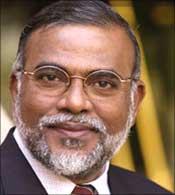 Food can be a distraction when people simply want to talk. And talk a lot. So its just as well that newly-inducted member of the Planning Commission Narendra Jadhav decides we will lunch in his smartly refurbished room at Yojana Bhavan on New Delhi's Sansad Marg, saving us plenty of time and precluding the dilemma of what to order from tantalising a la carte menus, writes Latha Jishnu.
Food can be a distraction when people simply want to talk. And talk a lot. So its just as well that newly-inducted member of the Planning Commission Narendra Jadhav decides we will lunch in his smartly refurbished room at Yojana Bhavan on New Delhi's Sansad Marg, saving us plenty of time and precluding the dilemma of what to order from tantalising a la carte menus, writes Latha Jishnu.
Jadhav's efficient secretary Sudha Rajagopal appears familiar with her boss's lunch preferences and has ordered dosas from the Coffee Board's outlet in the Planning Commission office to start with, followed by a grilled cheese and onion sandwich from Quick Bites which offers the illusion of choice to those who want a break from south Indian fare.
Lunch in this government office turns out to be unexpectedly pleasant. We are seated at a small table by the window which boasts clear glass and has an elegant rolled up chik instead of the standard issue curtains.
There are fresh white flowers on the dining table and a view of sorts, so it doesn't matter if the dosa is in an advanced stage of rigor mortis. Every bit of the makeover, from the faux antique occasional table to the chairs, has been decided by Jadhav himself between trips to Pune where he has just relinquished charge as Vice Chancellor of the University of Pune and talking assignments in different towns.
I like to oversee the smallest detail so that the result is just right, says this economist who has spent most of his working life (31 years) in the staid Reserve Bank of India which he left as principal adviser and chief economist.
He is finalising plans to shake up education, specially higher education, with lessons gleaned from his two-year stint in Pune. He is also mulling ways of creating an army of white collar workers in the country, people who are employable and useful to the economy.
For Jadhav, the vice-chancellorship was his breaking out assignment, the perfect job for a central banker seeking a more public role that would give him popular leverage. When the job was offered to him in 2006 he was in Afghanistan where he had been sent by USAID as the country's chief economic counsellor.
He was leading a team of economists who were formulating fiscal and monetary policy for the war-ravaged country, fixing interest rates, the interest rates and generally running the countrys economy, as he tells you with an amused glint in his eye.
That, I learn over the course of this lively but unusual lunch, is a marked Jadhav trait. He likes to throw in such hubris-laden statements unmindful of their impact because he revels in his achievements and accomplishments. And as he admits candidly, modesty has never been my forte.
Despite the power and pelf of the Kabul job (he was getting Rs 1.24 crore a year), he couldn't resist the chance to become the VC of Pune University which, he never tires of reminding audiences, is the largest traditional university in the world with 650,000 students, 536 affiliated graduate colleges and 330 recognised institutes.
But the real reason he took the assignment (with a 95 per cent cut in his salary) is personal. Pune is a place of rednecks and I was keen to go there as the Pope, declares Jadhav with unconcealed delight. Not too long ago it was the seat of the Peshwas, the hub of a caste-ridden society where my folk were humiliated and mistreated for their accident of birth.
There is the slightest rise in pitch as Jadhav relates how my ancestors had to go around with a pot strung around their neck so that their spittle would not pollute the ground and with a broom tied to their waists to wipe out their footprints.
So the caste thing is out, and I am relieved that I did not have to broach the subject of his caste myself. The fact that Narendra Jadhav is a Dalit may be irrelevant to his academic and professional achievements but remains central to his narrative. In the future it may become even more important.
Critics say he has played the caste card to get where he is, but Jadhav gets testy when asked about it. I wasn't even made deputy governor, for heavens sake. So what are they talking about?
True, he made a splash with his books on his Dalit family, a story that has been published in many languages, from Marathi to Korean, French and Italian, and has gone into many editions.
Untouchables (published abroad) is an international bestseller while Outcaste: A Memoir brought the remarkable saga of the Jadhav family he is the first generation to go to attend school to a wide audience here.
It is the Dalit factor that makes Jadhav of special interest to the political parties. What he did at the RBI or for the Ethiopian government in the 1980s is irrelevant in this context.
Jadhav has a certain way with the crowds with his earthy Marathi speeches he got unprecedented crowds whenever he held public meetings as the VC and his innovative schemes at Pune University which took academia to the villages have made him a popular figure in Pune.
But the big draw for political parties, the reason why they are all keen to flaunt him is the Narendra Jadhav success story. It is what I represent the symbol of hope for a large mass of Indian society that is waging a battle against prejudice, illiteracy and disempowerment, he says.
Prime Minister Manmohan Singh, a father-figure (he treats me like the son he does not have) and friend since the time Jadhav worked with him when he was governor of the RBI in the early 1980s, lauds him as such. So would it be easy for Jadhav the Dalit icon to turn into a politician leveraging the caste advantage? I am a people's person, he claims, and without the people factor I'd be lost.
That's an odd statement from a central banker who spent three decades and more writing on economic issues he has 11 scholarly books and close to 100 papers to his credit and championing Manmohan Singhs liberalisation policy, but Jadhav was evidently honing these skills during his time at the RBI.
In the past five years, parties have been wooing him but his political career is now on hold. He refused a Congress ticket in 2004 because he wasn't ready for the plunge, but lost his chance this year owing to the battle for seats between Sharad Pawar's NCP and the Congress.
Mayawati is keen on a Dalit of his stature and is known to have offered to put him up from a seat of his choice, while the BJP had offered to make him their Pune candidate. The Planning Commission assignment is seen as the Congress Party's recompense for having yielded Pune to the NCP (which lost the seat to the Shiv Sena, incidentally). But Jadhav is keen to correct the impression that it is a staging post for political career.
I am delighted with my Planning Commission portfolio, he says because education in particular is critical for India at this juncture than at any other time because of the demographic dividend we can earn.
As Jadhav dilates on the challenges of his portfolio (it includes labour, employment, sports and youth affairs along with art and culture) we dig into an amazingly pink concoction of ice cream with generous helping of fruits to round off the meal.
It comes from Kool Corner, the outlet which meets Yojana Bhavan's craving for dessert, and helps me sweeten my last question. Would he plump for a political future or bide his chance to become the RBI governor and put the first Dalit signature on the India's currency?
Jadhav's response is characteristic: Does it have be an either or choice?






